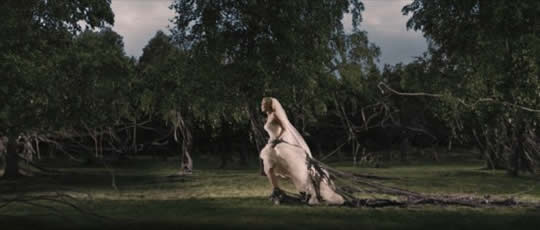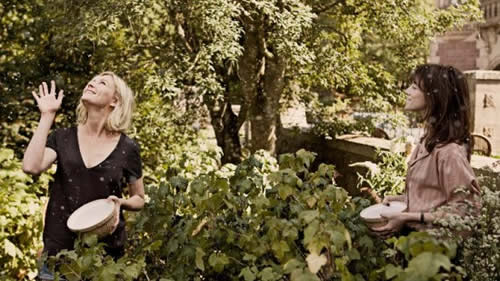 Cheer up, it’s not the end of the world…
Cheer up, it’s not the end of the world…
Melancholia is a film about two very different stories colliding (which for the plot is actually rather fitting). One in which a deeply depressed Kirsten Dunst sets ablaze to the happiest day of her life (a wedding so dire it makes Eastenders look like an episode of Glee) and the second story about a new planet hurtling across the galaxy on a collision course with earth.
The film focuses on 2 sisters Justine (Kirsten Dunst) and Claire (Charlotte Gainsbourg) with the first chapter revolving around Justine’s disastrous wedding day. Organised by her sister Claire and her husband David (Kiefer Sutherland) at great time and expense, the wedding descends into unorganised chaos as the seemingly cheery and whimsical Justine reveals her dark, depressing and destructive side. The couple arrive some 2 hours late, the speeches become a war of words between the sisters estranged parents, Justine runs off to behave very badly on a golf course (and I mean very badly) before having a bath when the cake is getting cut, affronting her boss publicly, and just generally destroying her life in an entirely annoying and slow paced manner.
Asides from a strikingly exquisite opening sequence in which thunderous classical music plays over extreme slow motion imagery of the characters being caught up in the apocalypse (Kirsten Dunst stands beautifully in sharp focus as a sky of dead birds rain down behind her) that ends in the world being destroyed, the first chapter of the film sinks into a depressive and dark fug that’s very hard to enjoy. Justine’s wedding is a long drawn out affair that falls from one distasteful and awkward situation to the next. The film rims around an artistic arsehollery that’s on a par with the self indulgent Tree of Life, with its grandeur images but with very little explanation. The only thing of merit that happens in the hour and a half that is chewed up by this disturbing wedding is Justine noticing a red star in the sky she has never seen before, and thus it sets the film up for act 2.
Then the most extraordinary thing happens, the film starts over with the focus on her sister Claire and the whole thing becomes immensely riveting. Claire takes responsibility for the now catatonic Justine, a shell of a human being since her implosion at the wedding. However the story now revolves around Melancholia the red star in the sky that is now revealed as being a distant planet that’s been hiding behind our sun and now meandering across the solar system to indulge in an intergalactic form of bowls. Claire’s husband David being somewhat of an astronomer tries to calm a panic ridden Claire that earth is not going to collide with Melancholia. Claire however remains sceptical, and an atmosphere of doom descends upon proceedings giving the film great flavour and tension. What follows is the two sisters holed up with Claire’s family in their country manor as they await Melancholia passing by earth.
 It’s a film initially about a disastrous wedding that turns into a disaster movie. It’s a pity the Kirsten Dunst glumfest dominates such a large part of the film, and unfortunately a lot of the audience in the film theatre I was in walked out long before Melancholia made an appearance. A true struggle to sit through, which is a shame because the latter half is one of the finest and most stylish end-of-the-world scenerios that’s even been put on screen. It’s captivating, it’s tense, and it’s well acted by a teary Charlotte Gainsbourg who worries that her young son will never grow up and experience life as Melancholia hurtles towards us.
It’s a film initially about a disastrous wedding that turns into a disaster movie. It’s a pity the Kirsten Dunst glumfest dominates such a large part of the film, and unfortunately a lot of the audience in the film theatre I was in walked out long before Melancholia made an appearance. A true struggle to sit through, which is a shame because the latter half is one of the finest and most stylish end-of-the-world scenerios that’s even been put on screen. It’s captivating, it’s tense, and it’s well acted by a teary Charlotte Gainsbourg who worries that her young son will never grow up and experience life as Melancholia hurtles towards us.
There’s no denying that some of the shots are gorgeously artistic and hugely visually arresting, but it’s impossible to recommend this film due to its excruciatingly dull and dark first chapter. If you have the patience to plough on throw it there is a fantastic story to be told and wonderfully so in the last hour. Try to survive through Dunst’s misery guts to see if they survive through Melancholia.

